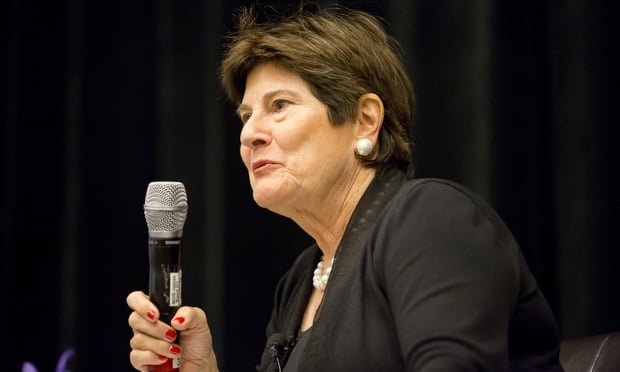 U.S. Court of Appeals for the Ninth Circuit in San Francisco. Photo: Jason Doiy/ALM
U.S. Court of Appeals for the Ninth Circuit in San Francisco. Photo: Jason Doiy/ALM
Employers are not permitted to use a worker's prior pay to justify compensating female and male employees differently for the same work, a federal appeals court ruled Thursday in a closely watched case confronting the contours of the federal Equal Pay Act.
The Equal Pay Act, or EPA, "requires employers to demonstrate that only job-related factors, not sex, caused any wage disparities that exist between employees of the opposite sex who perform equal work," Judge Morgan Christen of the U.S. Court of Appeals for the Ninth Circuit wrote in the case Rizo v. Yovino, where the Fresno County school district was sued for alleged pay discrimination.
"The express purpose of the act was to eradicate the practice of paying women less simply because they are women," Christen wrote for the majority. "Allowing employers to escape liability by relying on employees' prior pay would defeat the purpose of the act and perpetuate the very discrimination the EPA aims to eliminate."
Christen said the wage gap among American workers "has only narrowed, not closed," since Congress adopted the Equal Pay Act in 1963. "The wage gap persists across nearly all occupations and industries, regardless of education, experience or job title," she wrote.
Jones Day partner Shay Dvoretzky, who argued for Fresno County, was not immediately reached for comment Thursday.
Christen said "pervasive wage discrimination in the American workforce prevents prior pay from satisfying the employer's burden to show that sex played no role in wage disparities between employees of the opposite sex." She continued: "And allowing prior pay to serve as an affirmative defense would frustrate the EPA's purpose as well as its language and structure by perpetuating sex-based wage disparities."
The ruling is expected to be closely reviewed by labor and employment lawyers for any immediate and practical consequence.
The Ninth Circuit majority said the Equal Pay Act "does not prevent employers from considering prior pay for other purposes." The court continued: "For example, it is not unusual for employers and prospective employees to discuss prior pay in the course of negotiating job offers, and the EPA does not prohibit this practice. Certainly, our opinion does not prohibit this practice."
 Judge Margaret McKeown of the U.S. Court of Appeal for the Ninth Circuit. Photo: Jason Doiy / ALM.
Judge Margaret McKeown of the U.S. Court of Appeal for the Ninth Circuit. Photo: Jason Doiy / ALM.Judge M. Margaret McKeown of the U.S. Court of Appeals for the Ninth Circuit filed a concurring opinion that said the majority "fails to account for the realities of today's dynamic workforce, choosing instead to view the workplace in a vacuum. In doing so, it betrays the promise of equal pay for equal work and disadvantages workers regardless of gender identity."
The majority, McKeown said, had gone too far in concluding that "any consideration of prior pay is 'inconsistent' with the Equal Pay Act, even when it is assessed alongside other job-related factors such as experience, education, past performance, and training."
McKeown wrote in her concurring statement: "Employers do not necessarily violate the Equal Pay Act when they consider prior salary among other factors when setting initial wages. As always, the employer has the burden to show that any pay differential is based on a valid factor other than sex."
The ruling in the case Rizo v. Yovino marked the court's second look at allegations of gender-based pay discrimination under the Equal Pay Act.
The U.S. Supreme Court vacated an earlier Ninth Circuit decision—which Aileen Rizo, a math consultant for the Fresno County school district, had also won—after concluding that the vote of one of the panel judges, Judge Stephen Reinhardt, should not have counted because he died 11 days before the opinion was issued. Another judge was selected at random to participate on the en banc panel that took a second look at Rizo's claims.
"The Equal Pay Act stands for a principle as simple as it is just: men and women should receive equal pay for equal work regardless of sex," Reinhardt wrote in the original ruling. (Reinhardt has posthumously faced public claims from a former law clerk that he sexually harassed her. His defenders assert he was devoted to his law clerks.)
Lawyers for Fresno County said in court papers that "Rizo's pay disparity stemmed from differences between her and her colleagues' prior pay, it was based on a 'factor other than sex.' As a result, the superintendent cannot be held liable under the Equal Pay Act for that disparity."
Daniel Siegel of Oakland's Siegel, Yee, Brunner & Mehta argued for Rizo, who claimed in her suit that Fresno County schools had paid her $10,000 less than male colleagues.
"Allowing an employer to consider prior salary along with other factors in setting an employee's initial salary might mitigate but does not eliminate the discriminatory impact of past employment practices," Siegel told the appeals court in September. "Even if prior salary is valued at just 10% or less in an employer's assessment of the various factors to be considered in setting a new employee's compensation, it still brings a discriminatory factor into the equation."
READ MORE:
© 2025 ALM Global, LLC, All Rights Reserved. Request academic re-use from www.copyright.com. All other uses, submit a request to [email protected]. For more information visit Asset & Logo Licensing.








